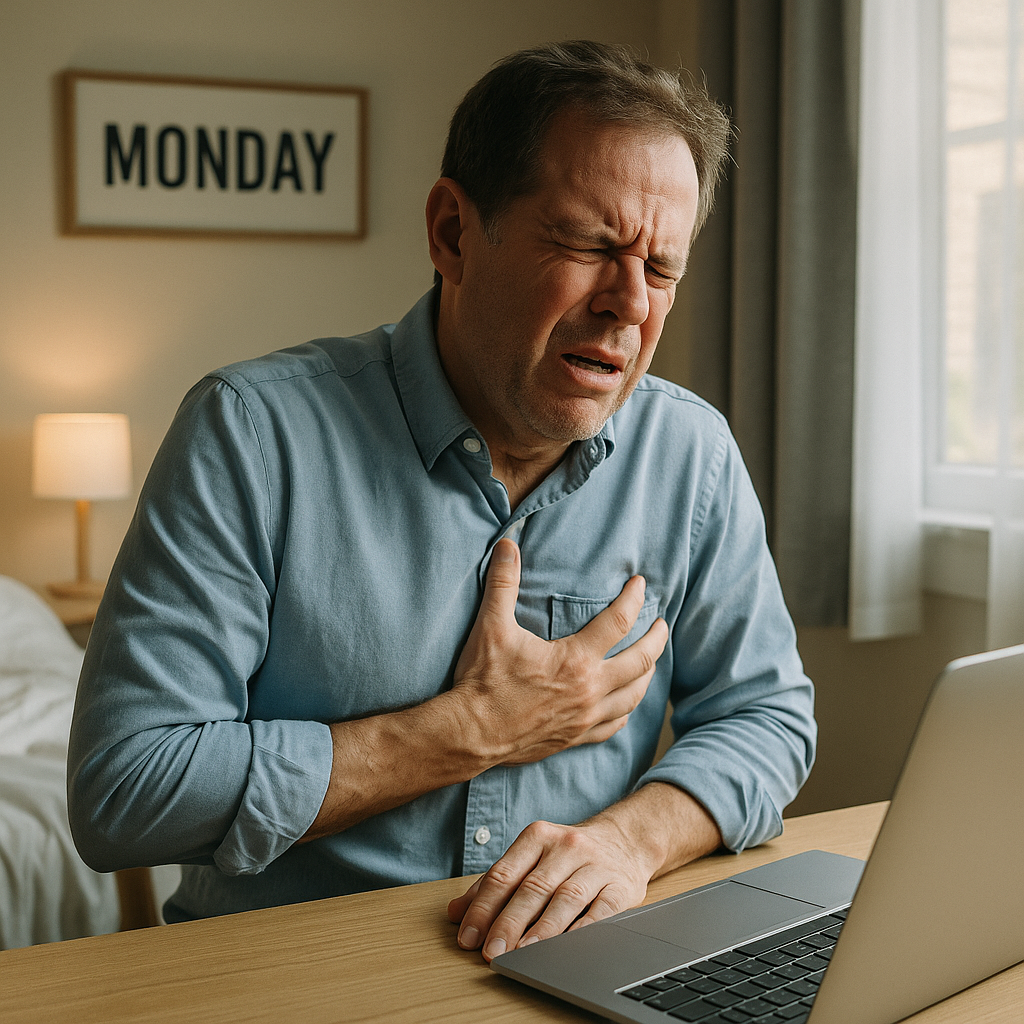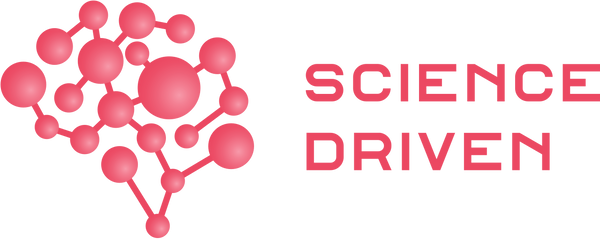
Did you know that Monday morning is when there are the most heart attacks?
Mike MunayShare
Take the day more calmly and follow some tips
We already knew that Mondays tend to be the hardest day of the week. We come here to rest and enjoy life, not to wake up early, to be with family and friends, and suddenly we have to go back to the work routine for five days. Let anyone who doesn't struggle to figuratively survive Monday throw the first stone.
But literally, Monday morning is also a dangerous day, as that's when we're most likely to have a heart attack.
Does this mean we should be afraid of Mondays? Absolutely not. If your physical and mental health is good, Mondays are as safe as any other day. But if your health is failing, they can be dangerous.
Knowledge is power and here we inform you in defense of science :)
The cortisol cycle
Cortisol is a hormone with a very bad reputation, the famous "stress hormone", and it is true, but it is also true that it is essential for life, so much so that if you run out of cortisol in your body, you will die in a few hours if you do not go quickly to the emergency room, but we will see this in another article, today we are coming to talk about high cortisol and heart attacks.
Chemically, it's a steroid (a glucocorticoid, to be exact) with the molecular formula C₂₁H₃₀O₅. It's produced in the cortex of the adrenal glands, which sit above our kidneys.
When we face stress or even just waking up after a night's fast, cortisol is released to kick-start the body's work.
What are you doing?
- Increases blood glucose (giving us quick energy)
- Maintains blood pressure at adequate levels
- Modulates the immune response
Among many other important functions. In fact, cortisol has anti-inflammatory effects and helps metabolize fats, proteins, and carbohydrates so we can face the day properly. Although we always portray it as "the bad guy," without cortisol we literally couldn't survive.
Now, cortisol acts very precisely, synchronized with our circadian rhythm, which marks our sleep-wake periods using light as a reference, all controlled from the suprachiasmatic nucleus (SCN) of the hypothalamus, our control tower.
It follows a very marked daily pattern:
- Maximum peak shortly after waking up (called cortisol awakening response).
- Progressive decline during the day.
- Minimum at night , so as not to interfere with deep sleep.
This pattern helps to "set the time" for other physiological rhythms: body temperature, energy metabolism, immune response... it's like the bell that signals the change of shift for the rest of the body.
The problem is that this hormone levels rise dramatically first thing in the morning (necessarily, as we've already seen), acting as our internal biological alarm clock. That morning surge of cortisol (and other hormones, like adrenaline) is what finally wakes us up: it raises blood pressure and pulse, and even clots our blood a little to prepare us for action. The real problem arises in predisposed individuals, as that same morning hormonal surge can trigger heart attacks.
In fact, cardiologists know that the first hours of the day are the most dangerous:
- Between 6 a.m. and noon, around 40% more heart attacks occur than during the rest of the day.
- The probability of a morning heart attack being fatal is 29% higher .
Why? As we mentioned, at dawn the body releases a storm of cortisol, adrenaline, and noradrenaline, which raises blood pressure and promotes blood clotting. It's the perfect cocktail for triggering a cardiac event in those who already have cholesterol plaques (arteriosclerosis) or other risk factors, such as hypertension, dyslipidemia (high cholesterol), diabetes, smoking, alcoholism, or chronic stress, among others, since with these conditions, the heart and cardiovascular system suffer much more from morning cortisol than a healthy person.
Add to this the fact that you're often under a lot of stress in the mornings, from getting ready for your workday, taking your kids to school, and not being late to work, and mornings become a battleground for your heart.
Now that we've explained why the probability of a heart attack is much higher in the morning, let's explain why on Mondays .
Socio-environmental factors
Before going into the details, the data.
The most severe heart attacks (STEMI) increase by approximately 13% on Mondays compared to the average on other days. You can find the original study in the references section.
The mind is ultra powerful, for good and for bad.
Our minds also play a role in this Sunday afternoon mess. Picture the scene: a peaceful weekend, with extra hours of sleep, your favorite TV show, and maybe a long lunch in good company. And suddenly, without warning... that thought appears: "Tomorrow is Monday." They call it Sunday scaries , or, if you prefer, that slump that mixes anxiety, laziness, and melancholy as we anticipate returning to work. It's not just your fault: up to 70% of people have experienced it at some point.
Psychology describes it as anticipatory anxiety, and its effects don't stay in your head. The body responds as if you were already in the middle of a problem: tense muscles, a knot in your stomach, insomnia, irritability... all because the simple thought of Monday activates our "fight or flight" response, with an early release of adrenaline and cortisol. Paradoxical, but true: we get stressed before the stress even starts. The result: we sleep worse on Sunday, start Monday with less energy and more accumulated tension, and emotionally start the week in the red. It's not our immune defenses that drop, but our emotional ones... and a tired and tense body is fertile ground for any overload.
Added to this is a less psychological and more physiological factor: weekend excesses. During the week, we tend to maintain more regular schedules and a somewhat more balanced diet out of sheer routine. But on Saturdays and Sundays, discipline is relaxed: heavy meals, alcohol, the occasional cigarette, late nights, late naps... all justified by the "I deserve it" mentality. The problem is that the body takes its toll. Cardiologists describe a classic risk pattern: more relaxed sleep, disordered habits, and a disruption of the circadian rhythm, that "social jet lag" of going to bed and waking up at different times, which leaves the body out of sync right at the start of the week.
On Monday, the cocktail is easy to imagine: mild dehydration, a mild hangover (although you might not call it that), high blood sugar from Sunday's desserts, drowsiness from poor sleep... and on top of that, the pressure of getting back to work.
If you demand maximum performance from your body when it's in poor shape, and then add stress to the mix, the likelihood of a heart attack is set to rise to the limit.
Extra danger
As if all of the above weren't enough, Monday morning not only tests the heart, but also those behind the wheel. The statistics are clear: in the early hours of Monday, traffic accidents skyrocket compared to any other time of the week. An analysis of driving records found that the period between 6:00 and 9:00 a.m. on Monday morning has the highest accident rate.
The explanation is almost a carbon copy of the one cardiologists give for heart attacks: several factors align at the same time. After two days of relaxed schedules, many drivers return to the road still half-asleep, with sluggish reflexes. The streets and highways, which had been quiet the day before, suddenly fill up: thousands of people start the week at the same time, and traffic becomes dense and slow. Added to this is the morning stress: the clock ticking, your head already on your 9 a.m. meeting or scrolling through your backlog of emails, and your attention while driving is diluted.
The result is predictable: more risk, less room for reaction. Driving drowsy, between traffic jams, and with your mind elsewhere is a sure recipe for something wrong. It's no surprise that, for many insurers, "early Monday morning" is the peak accident season, even surpassing the afternoon commute. So, if you're driving on a Monday morning, add a little extra patience to your routine. Not only will your car and your policy thank you for it, but your safety will too.
Reflection
At this point, the conclusion is clear: Monday morning is a small battlefield where biological, psychological, and social factors converge, capable of testing our health. But we are not at their mercy. Information is an advantage, and now that you know your body starts the week with a "hangover" of cortisol and stress, you can take action.
The key is to smooth the transition from Sunday to Monday. Get a good night's sleep the night before, prepare what you need so that dawn isn't a race against time, and give your body a gentler start. A simple gesture like getting up 15 minutes earlier, eating a leisurely breakfast, or putting on relaxing music on the commute can make all the difference.
Because, in the end, no urgent email or unpostponable meeting is worth more than your life. If you take care of your rhythm on Mondays, and the rest of the week, your heart will keep beating strong so you can enjoy not only next weekend, but many more.
References
- Belfast Health and Social Care Trust & Royal College of Surgeons in Ireland. (2023). Association between STEMI incidence and the start of the working week: a higher incidence on Mondays (OR 1.13). Presented at the British Cardiovascular Society meeting in Manchester.
- Elliot, W.J. (2001). Cyclic and circadian variations in cardiovascular events . American Journal of Hypertension, 14 (9 Pt 2), 291S–295S. https://doi.org/10.1016/S0895-7061(01)02174-4
- BlackboxMyCar. (2025, April 14). Monday Back-to-Work Crashes: Commuter Dash Cam Data Shows 6-9 AM Has Highest Accident Rate of the Week. BlackboxMyCar Blog.
- MedlinePlus. (n.d.). Acute adrenal insufficiency. U.S. National Library of Medicine (NIH). Retrieved from https://medlineplus.gov/spanish/ency/article/000357.htm
- Infobae. (2017, June 12). Why Monday is the day with the most heart attacks. Infobae – Health Section. Retrieved from https://www.infobae.com/salud/2017/06/12/por-que-el-lunes-es-el-dia-en-el-que-se-registran-mas-infartos/
- Trendencias (Palomares, A.). (2025, May 12). You are not alone. 70% of people feel the same anxiety as you on Sunday nights. Retrieved from https://www.trendencias.com/trabajo/no-quiero-que-llegue-lunes-como-lidiar-ansiedad-que-sentimos-domingos-noche
- 20minutos. (June 8, 2023). Heart attacks are more deadly on Mondays: these are the possible causes, according to science. 20minutos.es. Retrieved from https://www.20minutos.es/salud/actualidad/los-infartos-son-mas-mortales-los-lunes-estas-son-las-posibles-causas-segun-la-ciencia-5136012/
